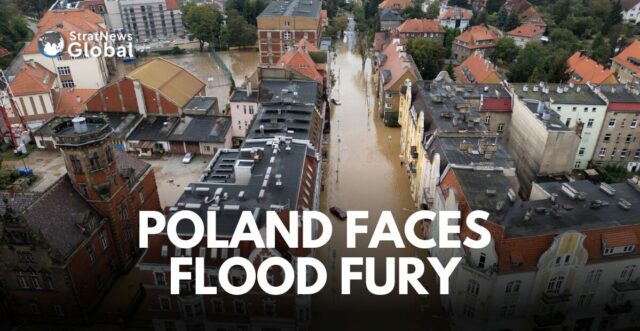Volunteers in the Polish town of Nysa fortified floodwalls to stem swollen rivers on Tuesday after heavy rain and flooding around central Europe that has killed at least 18 people.
Rivers were still spilling banks in the Czech Republic, while the River Danube was rising in Slovakia and Hungary, and flooding has also affected Austria.
The Czech-Polish border areas are among the worst-hit since the weekend, as gushing, debris-filled rivers devastated some towns, collapsing or damaging bridges and destroying houses.
Poland has declared a state of disaster in the area and set aside 1 billion zlotys ($260.38 million) for flood victims.
Overnight, volunteers helped rescue workers heave sandbags to build up the broken embankment around Nysa, a town of 40,000 in southern Poland.
Some residents were looking to check homes after evacuations were called on Monday.
“We had to escape, even though we have several floors,” 45-year-old resident Sabina Jakubowska said.
“At this point, it looks calm, the sun is shining, people are still crossing the bridge … we’ll try to go home too. But the water is still there on our street.”
National fire chief Mariusz Feltynowski said on Tuesday in meetings with Prime Minister Donald Tusk in the city of Wroclaw that the Nysa embankment was sealed, with military helicopters joining the operation to drop sandbags.
Rain-related Deaths
Historic Wroclaw, with 600,000 residents, was preparing for peaking water along the Odra (Oder) river. Its zoo called for volunteers to help pack sandbags to protect grounds, although animals were kept safely from flood zones.
Polish authorities have filled 75% of a giant reservoir near the Czech border, aimed at cutting water levels and preventing flooding waves on the Odra and Nysa from overlapping, which is what happened in massive flooding in 1997 that hit Wroclaw.
Flooding has killed seven people in Romania, where waters have receded since the weekend, plus four in Poland, four in Austria, and three in the Czech Republic.
Czech Prime Minister Petr Fiala said more than 13,000 people had been evacuated.
Tens of thousands of Czech and Polish households were still without power.
In the northeastern Czech city of Ostrava, a broken barrier on the Odra at its confluence with the Opava river caused flooding on Monday of the city’s industrial area including the BorsodChem chemical plant, coking plant OKK Koksovny and others.
In Hungary, at the historic towns of Visegrad and Szentendre, north of Budapest, authorities have put mobile dams in place preparing for the Danube floods.
Budapest is preparing for waters peaking near record levels, and has closed Margaret island, a recreational area with hotels and restaurants, where people have piled tens of thousands of sandbags to protect it.
(with inputs from Reuters)





